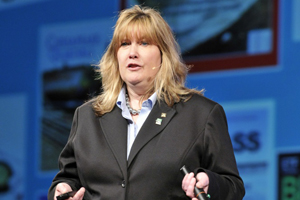Alltech Symposium challenges industry to make an impact

The Alltech 29th Annual International Symposium has come to a close, challenging delegates to take a glimpse into the future, search out opportunities to make an impact in the agribusiness industry and give the farmer of tomorrow a competitive advantage in the marketplace.
Speaking to more than 2,300 delegates from 72 countries, Rebecca Timmons¸ global director of applications research and quality for Alltech, kicked off the closing session highlighting the latest applications for algae in livestock and human nutrition.
While most of the attention on algae has focused primarily on it being a source for biofuel, microalgae contain large quantities of high quality eicosapentaenoic acid (EPA) and docosahexaenoic acid (DHA) that can bring additional nutritional improvements to feeds and food. Currently, the most common sources for DHA or “good fat” are fish meal and fish oil. However, Timmons said these products can often be inconsistent, unsustainable, unavailable, poor quality and unsafe.
At Alltech’s Algae production facility in Winchester, Ky., Alltech SP-1 was recently developed to provide a consistent source of algae with a wide range of benefits for a variety of species as well as improvements for both ends of the value chain. Besides seeing an increase in immunity, a decrease in mortality and increased litter size in their herds, producers who utilise feeds with this type of algae will also be able to further brand their products as value-added DHA Omega-3 enriched for consumers.
“It’s going to be two-fold; you’re going to have those benefits to the animals as well as through the enriched product to consumers. This means you will be improving your return while creating a healthier population of both humans and animals all at the same time,” Timmons said. “We can really change the way we feed the world, so we are not just looking at feeding the world but feeding them in a better way.”
Dr. Patrick Wall, University College Dublin, Ireland, expanded upon Timmons’ presentation, stressing the importance of food safety in feeding today’s growing population. The former veterinarian, medical doctor, businessman and European Food Safety Authority chairman said the curtain hasn’t fallen on food scares and that every day a chronology of food scares and recalls show up in the media.
“Your jobs are so important. If something goes wrong in the food chain, the repercussions are huge. Everything an animal eats – so do we,” Wall said. “It takes millions of dollars and years to build a brand, but can take a few seconds to destroy it.”
Wall said the problem with the food chain is that that we have convinced the consumer that it’s a straight line from farm to fork; however, there is a major disconnect between the final consumer and modern agricultural practices with issues such as a rising population, diverting food to fuel, global food trade, downward pressure on price and inconsistent country regulations. Wall said every agricultural corporation needs to develop a fully integrated risk-based system by choosing trusted suppliers, managing a well-trained staff, implementing a stringent quality control and regulatory system, using the latest in composite testing, being proactive with consumers and the media, and developing a safe feed culture at the leadership level.
“We have the fundamental goal to provide safe, nutritious food. We are in the human health business. Doctors and nurses are in the sickness business,” Wall said. “What is our most valuable asset? It’s not your farm, your stock or shares. It’s your health and the health of your friends and family. You are in the human health business.”
The Symposium’s 175 contributors, 20 sessions and 22 discussion dinners focused on how agribusiness can meet the challenge to produce enough food to feed three billion new urban dwellers, or nine billion people in total by 2050.













